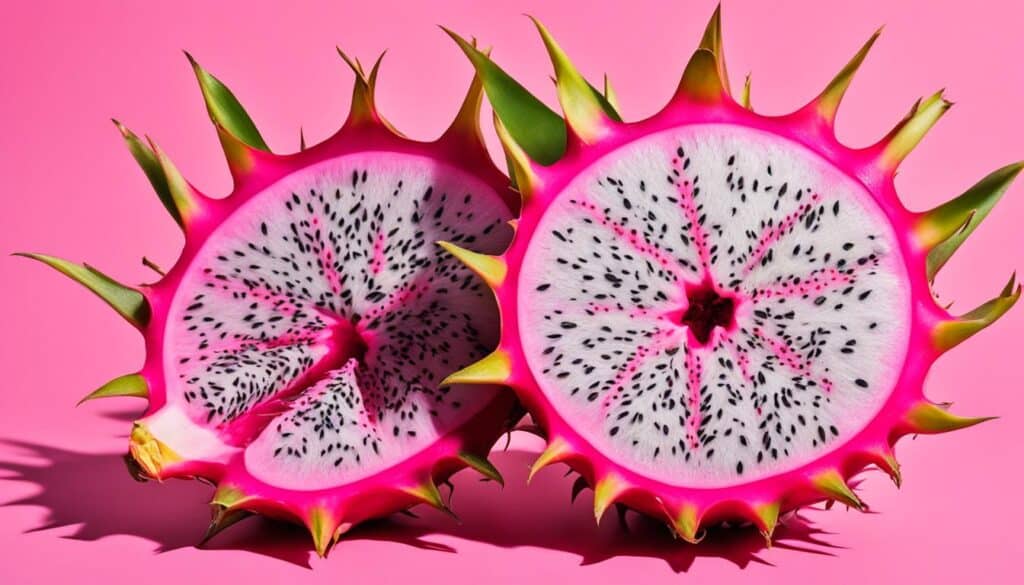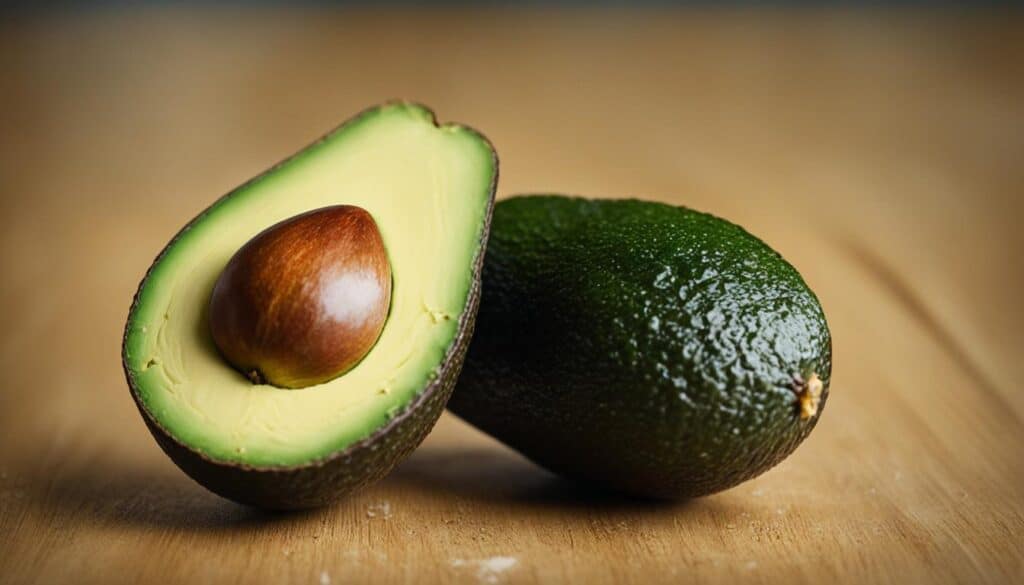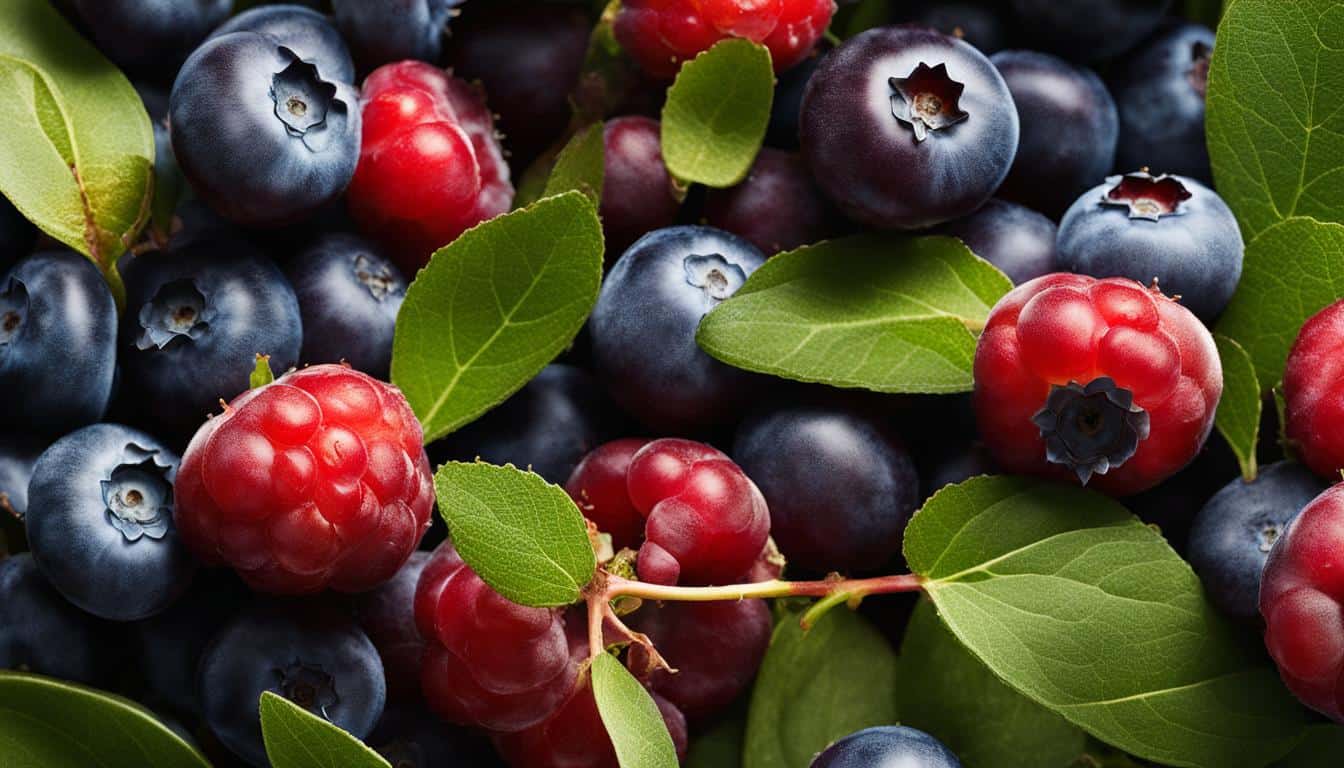Fruit is not only delicious but also incredibly good for our health. With so many fruits to choose from, it can be a challenge to determine which ones are the healthiest. In this article, I will share my top pick for the best fruit ever based on extensive research and expertise.
When it comes to choosing the best fruit, variety is key. Different fruits offer different sets of nutrients and benefits, so it’s essential to include as much diversity as possible in our diet. Each fruit brings its unique combination of vitamins, minerals, antioxidants, and fiber to the table.
To make the most of the health benefits that fruits offer, it is recommended to consume fruits of various colors. Different colors indicate different types of nutrients, so by eating a rainbow of fruits, we can ensure we are nourishing our bodies with a wide range of essential vitamins and minerals.
Now, without further ado, let’s dive into my top pick for the best fruit ever:
Key Takeaways:
- Eating a variety of fruits is essential for optimal health.
- Each fruit provides a unique set of nutrients and benefits.
- Choose fruits of different colors to maximize the range of nutrients.
- Include the top fruits in your diet to reap maximum health benefits.
- Remember to enjoy fruits as part of a balanced and nutritious diet.
Apples – Nutrient-rich and Disease-fighting
When it comes to nutrition and health benefits, apples are hard to beat. These delicious fruits are packed with a variety of nutrients that support overall well-being. From soluble and insoluble fiber to vitamin C and plant polyphenols, apples offer a range of advantages for your body.
One of the standout features of apples is their fiber content. They contain both soluble and insoluble fiber, making them an excellent addition to a healthy diet. Soluble fiber, such as pectin, helps manage blood sugar levels, while insoluble fiber like hemicellulose and cellulose supports digestion and gut health.
Apples are also a great source of vitamin C, an essential nutrient known for its immune-boosting properties. This powerful antioxidant helps protect against harmful free radicals and contributes to the overall health of your immune system.
In addition, apples are rich in plant polyphenols, which are bioactive compounds with strong antioxidant and anti-inflammatory properties. These polyphenols have been linked to a lower risk of various diseases, including heart disease, stroke, cancer, overweight, obesity, and neurological disorders.
It’s worth noting that most of the beneficial polyphenols in apples are found in the skin, so be sure to enjoy the fruit with its peel intact. By doing so, you’ll maximize your intake of these potent plant compounds and reap their many health benefits.
| Nutrient | Amount per Serving |
|---|---|
| Soluble Fiber | 2.4 grams |
| Insoluble Fiber | 1.5 grams |
| Vitamin C | 8.4 milligrams |
| Plant Polyphenols | Varies depending on the variety |
Note: Nutrient amounts are approximate and may vary depending on the size and variety of the apple.
With their impressive nutrient profile and disease-fighting properties, apples are a true powerhouse when it comes to supporting your health. So go ahead and bite into this crunchy fruit for a boost of nutrition and flavor.
Blueberries – Antioxidant Powerhouses
When it comes to superfoods, blueberries are at the top of the list. These little berries pack a powerful punch when it comes to health benefits. One of the reasons blueberries are so beneficial is their high content of anthocyanin, a potent plant pigment and flavonoid. This gives blueberries their vibrant blue color and is responsible for their antioxidant and anti-inflammatory properties.
Consuming blueberries regularly has been linked to a lower risk of several chronic conditions, including type 2 diabetes and heart disease. The antioxidants in blueberries help protect our cells from damage caused by harmful free radicals, reducing the risk of oxidative stress and inflammation in the body.
In addition to their antioxidant properties, blueberries have shown promise in combating obesity and overweight. Research suggests that the anthocyanins in blueberries may help regulate fat metabolism, preventing excessive weight gain.
“Blueberries are a true superfood that can benefit our overall health and well-being. Their rich antioxidant content makes them a powerful tool in preventing chronic diseases.”
Studies have also found that blueberries may have protective effects against certain types of cancer, including breast, colon, and pancreatic cancer. The anthocyanins in blueberries have been shown to inhibit the growth and spread of cancer cells.
Furthermore, blueberries have been associated with improving cognitive function and reducing the risk of cognitive decline. The antioxidants in blueberries help protect brain cells from damage, improving memory and overall brain health.
Other Berries with Similar Benefits
While blueberries steal the spotlight, they are not the only berries with these amazing health benefits. Other berries, such as blackberries, bilberry, elderberry, cherries, and chokeberries, are also rich in anthocyanins and offer similar protective effects against chronic diseases.
Ready to add more blueberries and other berries to your diet? Check out the table below for a breakdown of the nutritional content of blueberries:
| Nutrient | Amount per 1 cup (148g) |
|---|---|
| Calories | 84 |
| Carbohydrates | 21 grams |
| Fiber | 3.6 grams |
| Sugar | 15 grams |
| Protein | 1 gram |
| Fat | 0.5 grams |
| Vitamin C | 24% of the Daily Value (DV) |
| Vitamin K | 36% of the DV |
| Potassium | 114 milligrams |
| Anthocyanins | 14.2 milligrams |
With their delicious taste and numerous health benefits, adding blueberries and other berries to your diet is a smart choice. Whether enjoyed on their own, added to smoothies, or sprinkled over yogurt, these antioxidant powerhouses are a tasty way to support your overall health.
Bananas – More Than Just Potassium
When it comes to the health benefits of bananas, most people are aware of their high potassium content. However, these versatile fruits offer so much more than just this essential mineral. Bananas are a nutritional powerhouse, providing significant amounts of vitamin B6, vitamin C, and magnesium.
In addition to their vitamin and mineral content, bananas are rich in plant compounds called polyphenols and phytosterols. These compounds have antioxidant and anti-inflammatory properties, supporting overall health and well-being.
But that’s not all. Bananas also contain prebiotics, a type of fiber that acts as a food source for the beneficial bacteria in your gut. This promotes a healthy gut microbiome and improves digestion.
Green vs. Ripe Bananas
You may be wondering about the difference between green and ripe bananas. Green, unripe bananas are higher in resistant starch and dietary fiber. These types of carbohydrates are not easily digested, which means they provide a slower release of energy and help you feel full for longer periods.
On the other hand, ripe bananas are an excellent source of easily digestible carbs. They contain simple sugars that are quickly absorbed by the body, providing a quick burst of energy.

Bananas: A Summary of Key Nutrients
| Nutrient | Amount per 100g |
|---|---|
| Potassium | 358mg |
| Vitamin B6 | 0.367mg |
| Vitamin C | 8.7mg |
| Magnesium | 27mg |
Source: United States Department of Agriculture (USDA)
As you can see, bananas provide a wide range of essential nutrients that contribute to your overall health. Incorporating bananas into your diet is a delicious and nutritious way to enjoy the many benefits they offer.
Oranges – Vitamin C Powerhouses
Oranges are known for their high vitamin C content, providing 91% of the DV in a single fruit. They are also rich in potassium, folate, thiamine (vitamin B1), fiber, and plant polyphenols. Eating whole oranges has been linked to lower levels of inflammation, blood pressure, cholesterol, and post-meal blood sugar.
While orange juice provides nutrients and antioxidants, it lacks dietary fiber. Opt for whole oranges instead and limit juice consumption to 1 cup or less per serving.
Benefits of Oranges
Oranges are packed with essential nutrients that contribute to overall health. Here are some key benefits:
- High in Vitamin C: Oranges are a renowned source of vitamin C, which plays a crucial role in supporting the immune system and promoting collagen synthesis.
- Rich in Potassium: Potassium is an essential mineral that helps regulate blood pressure, support heart health, and maintain proper muscle and nerve function.
- Abundant in Folate: Folate, a B-vitamin, is important for proper cell division and growth, making it particularly crucial during pregnancy.
- Excellent Source of Fiber: Oranges are a great way to increase your fiber intake, promoting healthy digestion and aiding in weight management.
- Packed with Plant Polyphenols: Oranges contain various plant compounds with antioxidant and anti-inflammatory properties that can protect against chronic diseases.
Inciting a Quote
A juicy orange not only quenches your thirst but also provides a burst of refreshing vitamin C, invigorating your body with essential nutrients.
To further illustrate the nutritional value of oranges, here’s a table showcasing the specific amounts of key nutrients found in a medium-sized orange:
| Nutrient | Amount per Medium Orange |
|---|---|
| Vitamin C | 70mg |
| Potassium | 230mg |
| Folate | 40mcg |
| Fiber | 3g |
As shown in the table, oranges are packed with important nutrients that contribute to a balanced diet and optimal health.

The vibrant and refreshing taste of oranges makes them a delightful addition to your daily fruit intake. Whether enjoyed as a midday snack, in fruit salads, or as a freshly squeezed juice, oranges offer a nutritious and flavorful boost to your day.
Dragon Fruit – Exotic and Nutrient-rich
Dragon fruit, also known as pitaya, is a tropical fruit that is both exotic and nutrient-rich. This vibrant fruit is not only visually appealing but also offers numerous health benefits.
One of the standout qualities of dragon fruit is its high fiber content. Fiber plays a crucial role in our digestive health by promoting regularity and supporting a healthy gut. Incorporating dragon fruit into your diet can help ensure you meet your daily fiber requirements.
In addition to fiber, dragon fruit is a good source of iron, which is essential for the production of red blood cells and the transportation of oxygen throughout the body. Iron deficiency can lead to fatigue and weakness, making dragon fruit a valuable addition to a balanced diet.
Dragon fruit is also rich in vitamins C and E, which are powerful antioxidants that help protect our cells from damage caused by harmful free radicals. These vitamins contribute to a strong immune system and healthy skin.
Another noteworthy component of dragon fruit is its carotenoid content, including lycopene and beta carotene. Carotenoids are plant pigments that have been linked to various health benefits, including reducing the risk of chronic diseases and promoting eye health.
With its vibrant pink or white flesh, dragon fruit is not only visually appealing but also offers a refreshing and slightly sweet taste. It can be enjoyed on its own, added to smoothies, or incorporated into fruit salads for a delicious and nutritious treat.

Dragon Fruit Nutritional Information
| Nutrient | Amount per 100g |
|---|---|
| Fiber | 1.9g |
| Iron | 0.65mg |
| Vitamin C | 9mg |
| Vitamin E | 0.05mg |
| Carotenoids | Lycopene: 1.39mg, Beta carotene: 0.01mg |
*Values may vary based on the ripeness of the fruit.
“Dragon fruit is not only a tropical delight but also a nutritional powerhouse. Its rich fiber, iron, and vitamins C and E content make it a valuable addition to any diet.”
Mango – The King of Fruits
Mangoes, known as the “king of fruits,” are a nutritional powerhouse. They are an excellent source of potassium, folate, fiber, and a wide range of vitamins including vitamins A, C, B6, E, and K.
Mangoes are not only delicious but also packed with nutrients that support overall health. Potassium, present in abundance in mangoes, helps regulate blood pressure, maintain heart health, and support proper muscle and nerve function.
Fiber is another key component of mangoes, aiding in digestion, promoting regular bowel movements, and contributing to a healthy gut. Moreover, mangoes provide significant amounts of vitamins A, C, B6, E, and K, which are essential for a strong immune system, healthy skin, good vision, and blood clotting.
One of the standout nutrients in mangoes is mangiferin, a potent antioxidant. Mangiferin has been shown to protect against chronic diseases such as type 2 diabetes, heart disease, Alzheimer’s, Parkinson’s, and certain forms of cancer.
With its rich flavor and impressive nutritional profile, the mango deserves its title as the king of fruits.

Health Benefits of Mango:
- High in potassium, contributing to heart health and proper muscle function.
- Rich in fiber, promoting digestive health and regular bowel movements.
- Packed with vitamins A, C, B6, E, and K, supporting immune function, healthy skin, vision, and blood clotting.
- Contains mangiferin, an antioxidant that protects against chronic diseases.
Mangoes are not only delicious but also packed with nutrients that support overall health.
Avocado – Healthy Fats and Nutrients
Avocados are unique among fruits as they are high in healthy fats and low in natural sugars. They are primarily composed of oleic acid, a monounsaturated fat linked to better heart health. Avocados are also rich in potassium, fiber, and vitamins B6, E, and K.
One medium avocado contains approximately:
| Nutrients | Amount |
|---|---|
| Healthy Fats | 21 grams |
| Potassium | 975 milligrams |
| Fiber | 12 grams |
| Vitamin B6 | 0.56 milligrams |
| Vitamin E | 4.82 milligrams |
| Vitamin K | 38 micrograms |
In addition to these essential nutrients, avocados contain the carotenoids lutein and zeaxanthin, which are beneficial for eye health.
Research suggests that consuming avocados may improve cholesterol levels and promote feelings of fullness, aiding in weight management.

Section 9: Lychee – Refreshing and Nutrient-packed
Lychee, also known as litchi, is a fruit packed with nutrients. It is a rich source of vitamin C, potassium, fiber, and polyphenols with anti-inflammatory and antioxidant properties.
The vitamin C content in lychee is particularly notable, with a single serving providing over 100% of the recommended daily value. This essential vitamin plays a crucial role in boosting the immune system, promoting collagen production for healthy skin, and protecting cells from oxidative stress.
In addition to vitamin C, lychee is also a good source of potassium. Potassium is an important mineral that helps maintain healthy blood pressure, supports proper muscle and nerve function, and aids in hydration. With its potassium content, lychee can help balance electrolytes and promote optimal body functioning.
Polyphenols, another key component found in lychee, are plant compounds that have been associated with numerous health benefits. These polyphenols have anti-inflammatory and antioxidant properties that help protect cells from damage caused by free radicals. The combination of antioxidants and anti-inflammatory properties make lychee a valuable fruit for supporting overall health and well-being.
Lychee also contains other beneficial plant compounds such as gallic acid, chlorogenic acid, catechins, and caffeic acid, which contribute to its health-promoting effects. These compounds have been linked to various health benefits, including reducing the risk of chronic diseases, such as heart disease and certain types of cancer. They also possess antimicrobial properties and may help support a healthy gut microbiome.
Including lychee in your diet provides a refreshing and tasty way to boost your overall health. Whether enjoyed fresh, added to fruit salads, or incorporated into desserts and beverages, lychee offers a unique combination of essential nutrients and beneficial plant compounds.
Pineapple – Tropical Sweetness with Health Benefits
Pineapple is a popular tropical fruit that offers both sweetness and health benefits. It is a delicious and refreshing fruit that can be enjoyed on its own or incorporated into various dishes.
One of the main health benefits of pineapple is its high content of vitamin C. A single cup of pineapple provides more than the recommended daily intake of vitamin C, which is essential for supporting a healthy immune system and promoting collagen production for skin health.
In addition to vitamin C, pineapple is also a good source of manganese. Manganese is a mineral that plays a crucial role in metabolism, bone development, and antioxidant activity in the body.
Pineapple contains polyphenolic compounds, which are plant-based antioxidants known for their ability to fight against free radicals and reduce inflammation in the body. These compounds can help protect against chronic diseases, such as heart disease and certain types of cancer.
Another unique component of pineapple is bromelain, an enzyme that aids digestion. Bromelain has been shown to help break down proteins, improve digestion, and reduce bloating and inflammation in the gut.
Whether you enjoy pineapple as a snack, add it to your smoothies, or use it in salads and stir-fries, this tropical fruit not only adds a burst of sweetness to your dishes but also provides you with essential nutrients and health benefits.
Conclusion
In conclusion, exploring the world of fruits can be a flavorful and health-enhancing journey. Each fruit offers a unique set of nutrients and benefits, making it difficult to determine the overall best fruit ever. However, by incorporating a variety of fruits into your diet, you can ensure you are getting a wide range of essential nutrients.
Whether it’s apples, blueberries, bananas, oranges, dragon fruit, mangoes, avocados, lychee, pineapples, or any other fruit, they all contribute to a well-rounded and nutritious diet. These delicious fruits not only provide tantalizing taste experiences but also offer a bounty of health benefits. From their high antioxidant content to their ability to support heart health and aid digestion, fruits are essential for a healthy lifestyle.
So, don’t hesitate to enjoy the burst of taste and health benefits that fruits provide. Explore popular fruits like apples and oranges, indulge in exotic fruits like dragon fruit and lychee, savor the sweetness of pineapples, and relish the creamy goodness of avocados. Embracing a variety of fruits will not only keep your taste buds delighted but also ensure you are nourishing your body with an abundance of nutritious fruits. Make fruits an essential part of your diet and discover the wonders they can do for your overall well-being.
FAQ
What makes apples so nutritious?
Apples are rich in both soluble and insoluble fiber, vitamin C, and plant polyphenols, which have been linked to a lower risk of heart disease, stroke, and certain types of cancer. The skin of the apple contains most of the beneficial polyphenols, so be sure to eat it!
How do blueberries benefit our health?
Blueberries are packed with antioxidants and have anti-inflammatory properties due to their high content of anthocyanin. Consuming blueberries has been associated with a lower risk of type 2 diabetes, heart disease, and cognitive decline.
What nutrients do bananas provide?
Bananas are a good source of potassium, vitamin B6, vitamin C, and magnesium. They are also high in prebiotics, a type of fiber that promotes the growth of beneficial gut bacteria.
What are the health benefits of oranges?
Oranges are known for their high vitamin C content and are rich in potassium, folate, and fiber. Eating whole oranges has been linked to lower levels of inflammation, blood pressure, cholesterol, and post-meal blood sugar.
What nutrients does dragon fruit offer?
Dragon fruit is rich in fiber, vitamins C and E, and carotenoids. It also has antioxidant and anti-inflammatory properties, making it a delicious and nutritious addition to your diet.
What makes mangoes a nutritional powerhouse?
Mangoes are an excellent source of potassium, folate, fiber, and vitamins A, C, B6, E, and K. They also contain the antioxidant mangiferin, which helps protect against chronic diseases like type 2 diabetes and heart disease.
What makes avocados unique?
Avocados are high in healthy fats and low in natural sugars. They are also rich in potassium, fiber, vitamins B6, E, and K, and contain the carotenoids lutein and zeaxanthin. Consuming avocados may improve cholesterol levels and promote feelings of fullness.
What nutrients does lychee provide?
Lychee is a rich source of vitamin C, potassium, fiber, and polyphenols with anti-inflammatory and antioxidant properties. It contains beneficial plant compounds such as gallic acid, chlorogenic acid, catechins, and caffeic acid.
What health benefits does pineapple offer?
Pineapple is rich in vitamin C, manganese, and polyphenolic compounds with antioxidant and anti-inflammatory properties. It also contains bromelain, an enzyme that aids digestion.





Leave a Reply